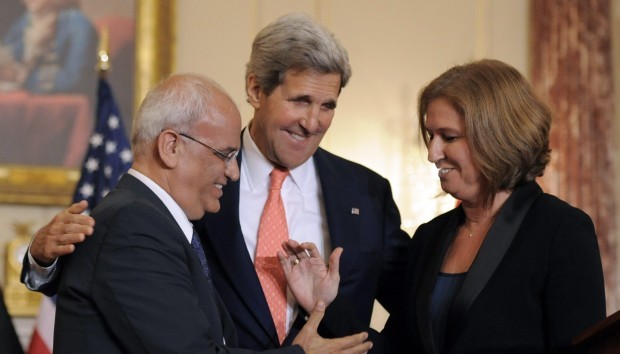On July 30, after preliminary talks about talks in Washington DC, Secretary of State John Kerry announced that “sustained, continuous and substantive negotiations” between Israelis and Palestinians “to achieve a final status agreement” would commence within two weeks. He also set a nine-month time limit for the successful conclusion of these negotiations.
Why should—and how could—this nine-month deadline be more meaningful than all the previous deadlines in the seemingly perpetual Middle East “peace process”?
Throughout this “peace process,” all deadlines, starting with the five-year deadline for achieving a permanent peace agreement set out in the Declaration of Principles (also known as the Oslo Accords) signed almost 20 years ago, have been consistently and predictably missed. Such failures have been guaranteed by the practical reality that, for Israel, “failure” has had no consequences other than a continuation of the status quo, which, for all Israeli governments, has been not only tolerable but preferable to any realistically realizable alternative.
For Israel, “failure” has always constituted “success,” permitting it to continue confiscating Palestinian land, expanding its West Bank colonies and generally making its occupation of Palestine even more permanent and irreversible.
In everyone’s interests, this must change. For there to be any chance of true success in this or any new round of negotiations, failure must have clear and compelling consequences which Israelis would find unappealing—indeed, at least initially, nightmarish.
In an interview published on November 29, 2007, in the Israeli daily Ha’aretz, Prime Minister Binyamin Netanyahu’s predecessor, Ehud Olmert, declared, “If the day comes when the two-state solution collapses, and we face a South African-style struggle for equal voting rights (also for the Palestinians in the territories), then, as soon as that happens, the State of Israel is finished.”
This interview helpfully referred to a prior Ha’aretz article, published on March 13, 2003, in which Mr. Olmert had expressed the same concern in the following terms: “More and more Palestinians are uninterested in a negotiated, two-state solution, because they want to change the essence of the conflict from an Algerian paradigm to a South African one. From a struggle against ‘occupation,’ in their parlance, to a struggle for one-man-one-vote. That is, of course, a much cleaner struggle, a much more popular struggle—and ultimately a much more powerful one. For us, it would mean the end of the Jewish state.”
If Israeli public opinion could be brought around to sharing the perception of Israel’s position and options reflected in Mr. Olmert’s perceptive public pronouncements, the Palestinians would be entering this new round of direct negotiations in a position of strength, intellectually and psychologically difficult though it would be for Palestinians to imagine such a dramatic role reversal.
All that the Palestinian leadership would need to do is to state at the time that this new round of negotiations commences that, if a definitive peace agreement on a two-state basis has not been reached and signed within the nine-month deadline fixed by Secretary Kerry, the Palestinian people will have no choice but to seek justice and freedom through democracy—through full rights of citizenship in a single state in all of Israel/Palestine, free of any discrimination based on race or religion and with equal rights for all who live there.
The Arab League should then publicly state that the very generous Arab Peace Initiative, which, since March 2002, has offered Israel permanent peace and normal diplomatic and economic relations with the entire Arab world in return for Israel’s compliance with international law, remains on offer but will expire and be “off the table” if a definitive Israeli-Palestinian peace agreement has not been reached and signed within this nine-month deadline.
Framing the choice before Israelis with such clarity would ensure that the Israeli leadership would be inspired—indeed, compelled—to make the most attractive two-state offer to the Palestinians which Israeli public opinion could conceivably find acceptable and approve in the promised referendum on any peace agreement.
At that point—but not before—serious and meaningful negotiations could begin.
Israel’s vast colonization program may already have made it too late to achieve a decent two-state solution (as opposed to an indecent, less-than-a-Bantustan one), but, with the choice so framed, a decent two-state solution would never have a better chance of being achieved. If it is indeed too late, then Israelis, Palestinians and the world will know and can thereafter focus their minds and efforts constructively on the only other decent alternative.
It is even possible that, if forced to focus on the prospect of living in a fully democratic state with equal rights for all its citizens—which, after all, is what the United States and the European Union hold up, in all other instances, as the ideal form of political life—many Israelis might come to view this “threat” as less nightmarish than they traditionally have.
In this context, Israelis might wish to talk with white South Africans. The transformation of South Africa’s racial-supremacist ideology and political system into a fully democratic one has transformed them, personally, from pariahs into people welcomed throughout their region and the world. It has also ensured the permanence of a strong and vital white presence in southern Africa in a way that prolonging the flagrant injustice of a racial-supremacist ideology and political system and imposing fragmented and dependent “independent states” on the natives could never have achieved. This is not a precedent to dismiss. It could inspire.
Any new negotiations toward ending the occupation of Palestine on a two-state basis and achieving peace with some measure of justice must be subject to a genuine and credible “final” deadline for success, and must have clear and unambiguous consequences for failure. Whether the future of the Holy Land is to be based on partition into two states or on full democracy in one state, a definitive choice must now be made. A fraudulent “peace process” designed simply to kill more time can no longer be tolerated.
